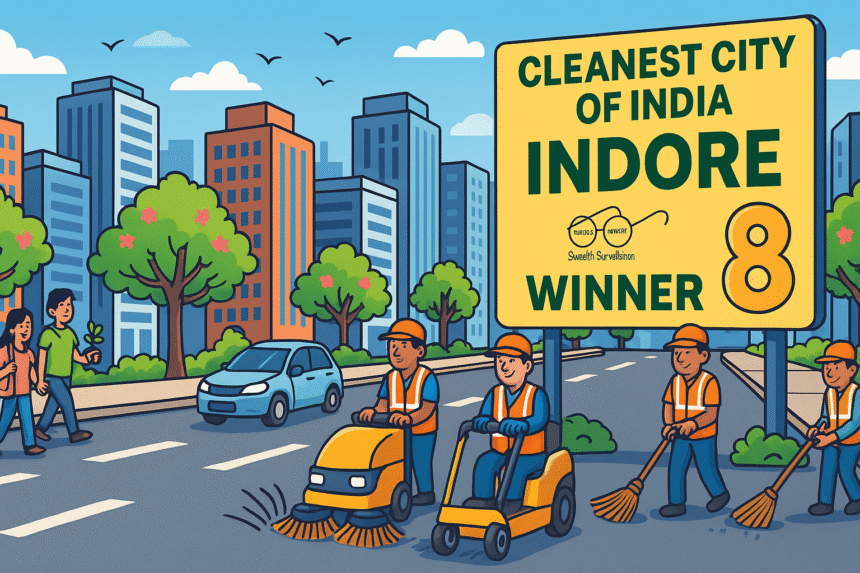Indore—The Undisputed “Swachh” Superstar
Move over Bollywood blockbusters—there’s a new sequel that just dropped, and it’s cleaner than ever. Yes, you guessed it—Indore has done it again! For the eighth time in a row, the city has bagged the title of Cleanest City in the Swachh Survekshan 2024 awards. If cleanliness had a trophy cabinet, Indore’s shelf would need extra floors.
- Indore—The Undisputed “Swachh” Superstar
- 🧼 What is Swachh Survekshan Anyway?
- 🧽 Indore’s Winning Formula
- 🧼 Who Came Close?
- 🧽 Citizens Speak: “We Don’t Litter Because It Feels Wrong”
- 🧼 Cleanliness Has Benefits (Beyond Bragging Rights)
- 🧽 What Can Other Cities Learn?
- 🧼 Swachh Bharat 2.0: Where Do We Go From Here?
- 🧽 Final Thoughts: Clean is the New Cool
- 🧼 TL;DR (Too Lazy; Didn’t Rinse)
In the league of swachhta, where most cities fumble with overflowing bins and confused recycling, Indore has turned cleanliness into a culture—and an art form.
🧼 What is Swachh Survekshan Anyway?
Let’s begin with the basics:
Swachh Survekshan is India’s largest cleanliness survey conducted by the Ministry of Housing and Urban Affairs under the Swachh Bharat Mission. It evaluates cities on various cleanliness parameters—like waste segregation, citizen participation, sanitation, innovation, and of course, whether your neighbourhood smells like roses or rotting leftovers.
This year’s survey saw participation from over 4,500 cities. It’s like the IPL of hygiene, only instead of cricket bats, we have brooms—and instead of sixes, we celebrate zero litter.
🧽 Indore’s Winning Formula
So, how does one become the cleanest city not once, not twice, but eight times in a row? Here’s Indore’s winning combo:
1. People Power
From school kids to shopkeepers, everyone in Indore participates in keeping the city squeaky clean. You’ll rarely find anyone chucking a wrapper casually. Why? Because they know that “Swachh Indore” is not just a campaign—it’s pride, identity, and a daily routine.
2. Tech Meets Trash
Indore doesn’t rely on old-school garbage trucks alone. It uses GPS-tagged vehicles, real-time waste tracking, smart bins, and even a mobile app where you can complain if your street isn’t sparkling.
3. Zero Waste Philosophy
The city has aggressively pushed for waste segregation at source—wet waste and dry waste go into separate bins, and most of it is recycled or converted into compost. They’ve even built a 600-tonne capacity bio-CNG plant using organic waste.
4. Cleanliness with Style
Walls in Indore are not canvases for paan stains—they are canvases for stunning murals. Public spaces have art installations made from recycled materials. Trash cans wear vibrant colours and public toilets have gone five-star. Seriously, one might just take a selfie there.
🧼 Who Came Close?
Trailing behind the champ was Surat, Gujarat, which secured second place—again proving it’s not just diamonds the city polishes. Navi Mumbai took the third spot, and these two cities are emerging as strong contenders in the war of waste.
But make no mistake, Indore remains the Shah Rukh Khan of Swachh Survekshan—it owns the box office of cleanliness.
🧽 Citizens Speak: “We Don’t Litter Because It Feels Wrong”
A walk through Indore’s streets shows something rare in urban India—civic pride. You won’t just see sanitation workers at it, but also residents politely correcting someone about disposing trash correctly.
Local chaiwala Mukesh Bhai puts it beautifully: “Kachra toh sab nikaalte hain, par Indore walon ne uska career bana diya hai.”
🧼 Cleanliness Has Benefits (Beyond Bragging Rights)
Let’s be real—this isn’t just about trophies or Swachh Survekshan rankings. A clean city brings serious perks:
- Improved health: Less garbage, fewer diseases.
- Tourism boost: Who doesn’t love a fresh, fragrant city?
- Better quality of life: Clean roads = happier citizens = peaceful honking (maybe).
Even businesses prefer setting up shop in cities that don’t smell like open drains. So yeah, a little dusting and sweeping go a long way in attracting investments.
🧽 What Can Other Cities Learn?
Indore’s message is loud and clear: Cleanliness is not just a government job; it’s a citizen movement. Here’s a Swachhta Starter Pack for other cities:
- Make it emotional: People care more when it’s about their identity.
- Tech it up: Use data to track performance and fill the gaps.
- Reward behavior: Incentivize clean zones with public appreciation.
- Engage youth: School programs, college competitions, and community drives.
- Treat sanitation workers with dignity: Equip them, respect them, and pay them well.
🧼 Swachh Bharat 2.0: Where Do We Go From Here?
With Indore raising the bar every year, it’s time to think bigger. How about:
- Smart trash management using AI-powered bins
- Digital waste footprint trackers for every household
- Inter-city clean-offs with cash prizes (and fewer political rallies)
The real dream? A country where every city competes not for votes, but for vacuumed streets.
🧽 Final Thoughts: Clean is the New Cool
Indore’s eighth consecutive Swachh Survekshan win is not just a win for the city—it’s a reminder that sustained change is possible, even in India, even with dust, chaos, and 1.4 billion opinions.
So whether you’re in Delhi, Dhanbad, or Dibrugarh, ask yourself:
- Do I sort my waste?
- Do I pick up after myself?
- Do I believe cleanliness is my job too?
Because let’s face it—clean cities aren’t born, they’re built. One biodegradable bag at a time.
🧼 TL;DR (Too Lazy; Didn’t Rinse)
- Indore has won Cleanest City title for the eighth time in the Swachh Survekshan 2024.
- City’s success lies in citizen participation, tech innovation, and zero waste practices.
- Other top performers: Surat and Navi Mumbai.
- Cleanliness boosts health, economy, and civic pride.
- Lesson: A cleaner India is possible if we all pick up that one wrapper.
Let’s say it together now—Swachhta is not just a campaign, it’s a character trait.
And clearly, Indore has the cleanest personality of them all.












